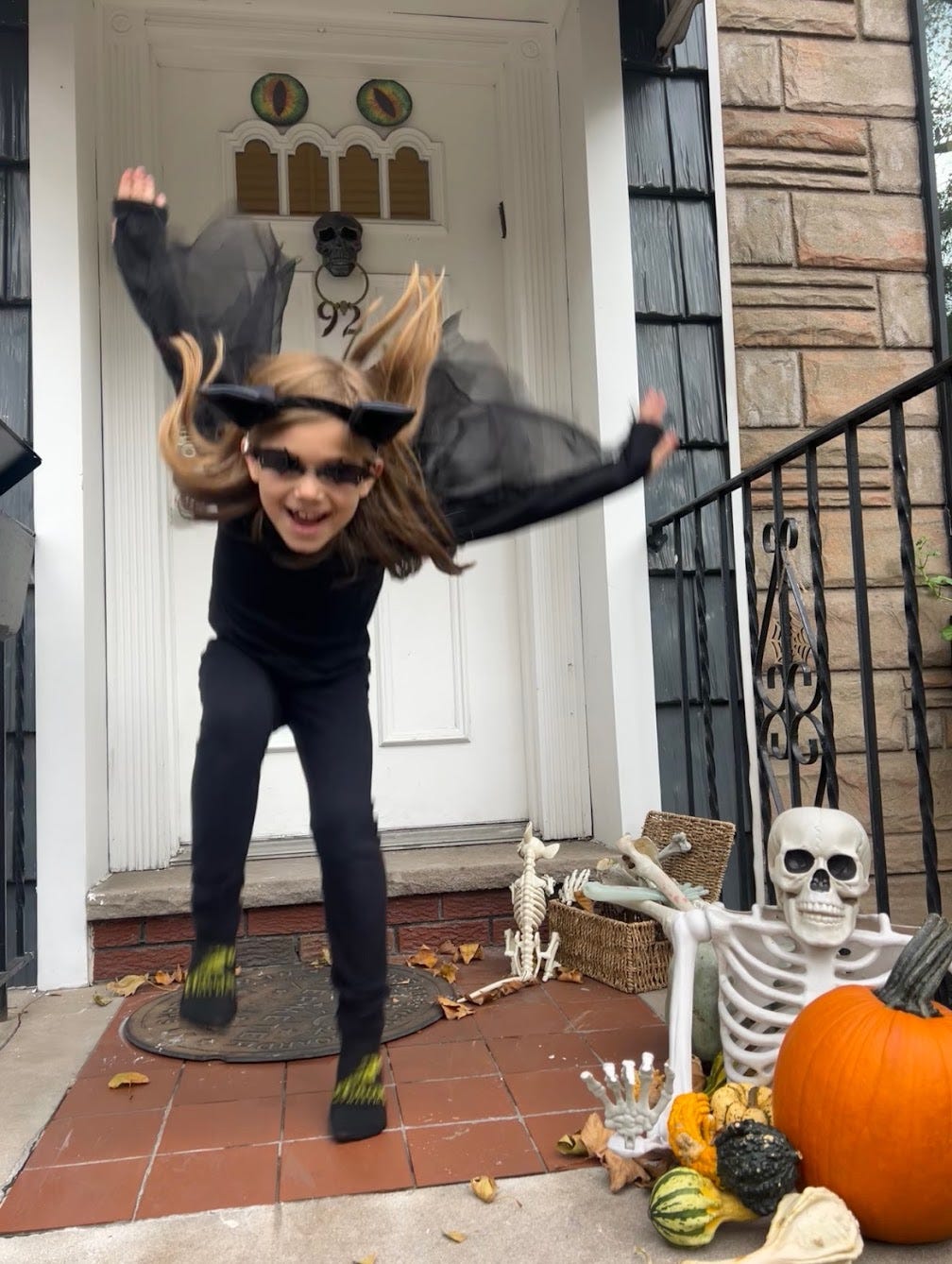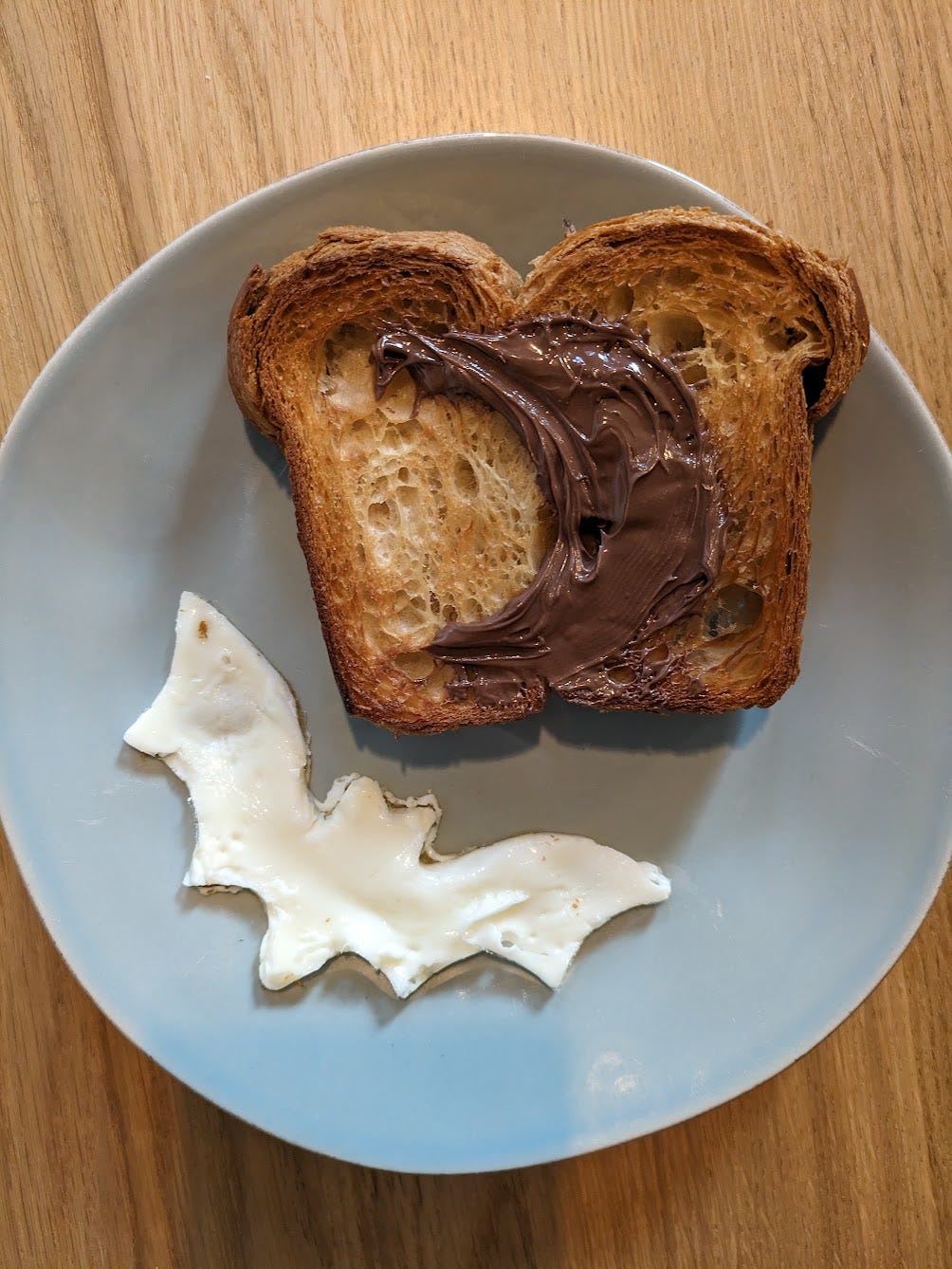How This Can End
Bringing up children a different way
Hello friends.
First, a moment of joy.
Remember how I said I was tired?
I am! And the next couple of months are going to be even busier than this one. But also I really love Halloween. I love transformation, and imagination, and (let’s be honest) chocolate. I love hand sewing costumes even though I can’t really sew. I love making spooooooky breakfast, which also includes chocolate.
I love it all, especially as a distraction when things in the world are not great.
Now, on to the newsletter.
The other day my husband and I were wondering how the crack epidemic ended.
Yes, this is what passes for light conversation in our house.
When we were growing up in the 90s, the smokable, cheap, highly addictive form of cocaine was ravaging cities. Enormous sentencing disparities between powder and crack cocaine were decimating Black neighborhoods. And racist rhetoric about ‘crack babies’ was dehumanizing a generation of children as “doomed” (most of it turned out to be nonsense).
What happened?
There’s competing theories. But according to a New York Times story that ran in 1999, the police, despite (or perhaps because of) arresting 900,000 people in a single decade, weren’t the heroes of this story. It was the children, determined to grow up a different way.
“there was a generational revulsion against the drug. 'If you were raised in a house where somebody was a crack addict, you wanted to get as far away from that drug as you could,'' said Selena Jones, a Harlem resident whose mother was a chronic crack user. ‘People look down on them so much that even crackheads don't want to be crackheads anymore.’''
I’ve been thinking a lot about how bad things end.
Maybe because my overwhelmed and tired brain is skipping ahead from the misery and anguish of this current moment, which is one where more children have been killed in Gaza and the West Bank this past month than in all armed conflicts around the world in each of the past three years. And one where 29 Israeli children and youth are being held hostage under those same bombs. And one where many people are angry or sad enough to believe we have to mete out our compassion in some kind of Solomonic division, make some kind of false equivalence or comparison between the two measures of misery, when both are immeasurable.
In any case, I’m thinking about how terrible things end, and how new generations decide that they want something better out of life, and that they can get it. Because this is my lane—raising better kids for a better world.
Mentioned in Ezra Klein’s podcast this week was a book by Audrey Kurth Cronin, Director of the Carnegie Mellon Institute for Strategy and Technology, titled, appropriately enough, How Terrorism Ends.
[Caveat here: I’m not conflating all Palestinian people with terrorists or saying their struggle for independence is an inherently terrorist cause. I believe in everyone’s right to self-determination, peace and freedom. Hamas, which attacked Israel, is a terrorist group, and the declared enemy in this war.]
Studying terrorist movements around the world over two centuries, Kurth Cronin found they end in one of four ways. 1) You kill the leader, 2) You negotiate a peace, 3) You repress them with overwhelming force, or 4) You successfully promote an alternative and they become marginalized, irrelevant, and implode.
The third strategy, repression, is not a great one for democracies to pursue. Because it generally involves killing a lot of civilians, which produces blowback and can warp and split a country internally until it’s not a democracy anymore. As Kurth Cronin wrote recently of Israel’s war on Gaza in Foreign Affairs:
“Hope is not a strategy”—and neither is anger.
…killing with little discrimination or restraint places revenge ahead of logic.
The history of modern counterterrorism holds a clear lesson: only through the strict targeting of a terrorist organization can a state permanently crush it and avoid a wider conflict…
Without a clear endgame, a renewed occupation of Gaza could further split [Israel].
In other words: Punish the guilty, not the innocent. If you punish the innocent, you become guilty. If you treat everyone as an enemy, your enemies will multiply, and it could be your own country that implodes.
But one thing, Kurth Cronin assures us in her book, is true: All terrorist movements eventually end.
This, too, will end.
And what happens then? Children on both sides of a conflict, first, need to be able to grow up. They need essential nurturing care, ideally from family members; in other words, they need adults around them who aren’t completely broken. And they need a better future to believe in. A lot of that depends on what leaders do, which can leave ordinary people feeling helpless. I feel pretty helpless right now.
But I also know there are things we can do.
For example, I’m currently working on a story about the dawning recognition of the need to support early childhood development among the millions of children affected by crisis. One surprising way this can be done is through media that teaches emotional regulation, inclusion, understanding and mutual respect.
As parents, and members of communities, we can refuse to subscribe to binaries or withdraw within the boundaries of our own tribe. We can refuse to circumscribe our naturally overflowing compassion. We can share the injustices of the world with our kids, but gently, giving them empowering ways to respond.
If they grow up to look at the world’s addiction to violence, shake their heads, and say they want something better, we can hug them and say, “me, too.”
Exactly
After my last newsletter, my friend Jay Michaelson shared this conversation between his husband and their daughter:
5 3/4 year old: Why are the rockets in Israel bombs? (Usually rockets are cool things that go to the moon.)
P.: Well, there's a war right now, and people are fighting.
5 3/4: Why are they fighting?
P.: Well, there are two groups of people and they both want the same land.
5 3/4: Why don't they share it?
Some links
Standing Together is a grassroots, Arab-Israeli social movement for peace, equality, and climate justice. It’s hard right now, they say. “"The real work…is after this war is over."
This is an unbearable read by a mother, about mothers and children.
I talked to Anastasia Goodstein at the Ad Council about climate anxiety and youth mental health.
It was exciting to be a part of Climate Action Day, a free online live event jam-packed with speakers from Take Action Global, which supports students in 153 countries to take climate actions in schools.





